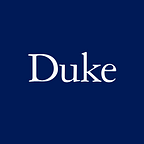Lights, Camera, Pandemic
Editor’s note: This essay is one in a series of first-person narratives by members of the Duke community reflecting on a year living with COVID-19.
Last summer, I found myself preparing for a class I never expected to teach. The class, GSF 225: Women in the Political Process, is supported by a generous donation from Ruth Huffman Carr with the stipulation that it be taught every fall of an election year. We had hired an esteemed colleague from another institution to teach the class, but those plans — along with so, so many others — fell apart as the impact of Covid-19 became increasingly apparent.
In many ways, I was grateful for the opportunity. As a historian of women in politics (albeit mostly outside the United States), I was excited to talk with students about the centennial of the Nineteenth Amendment and about what was clearly shaping up to be a historic election cycle. The murder of George Floyd in late May had drawn global attention to the tragedies precipitated by endemic racism, giving a vivid context to explore the thorny racial dynamics of the US women’s suffrage campaign. I imagined a class that would explore the complex interaction of race and gender in the political realm, including everything from grassroots organizing and mothers’ clubs to presidential campaigns and heads of state.
I found myself confronting a tricky question: the class is coded as research-intensive but not writing-intensive. As a historian, I struggled to imagine what it might look like to separate the two. I had designed progressive assignments designed for students to build and analyze an archive centered on women in the 2020 political campaigns, but what were they supposed to do with all that research, if not write about it?
As if reading my mind, an email arrived out of the blue in July from Center for Documentary Studies director Wesley Hogan, who was looking for ways to integrate documentary films into classrooms. A Zoom meeting (of course!) with her and a recent MFA student, Lauren Henschel, opened up a whole new world of possibilities: the students would make their own documentary films!
None of the students had ever made a film before, and they had enrolled in the class expecting a more conventional set of assignments. Still, they were all game to try and — over the course of one semester — researched and produced short documentaries, either individually or in groups. We concluded the semester with a virtual film festival, allowing the students to share their work with friends and family. The films not only displayed the students’ immense talents but also the possibilities that open up when they have the opportunity to present their research in such an innovative way.
The Ruth Huffman Carr endowment allowed me to hire Lauren to work with the students on the creative and technical aspects of their projects, while a TA, Martha Espinosa, and I worked with them on the research and analytic aspects. The assignment allowed them to make the most of the fact that we were all constrained to remote research: Zoom interviews, videos of news conferences, radio segments, and digitally available images. It was thrilling to watch students construct narratives out of fragments of digital materials.
The success of this small experiment has inspired me to look for ways to expend upon it. For the students, it offered not only a novel way of presenting their research and analysis but also allowed them to develop the technical and visual literacy skills that are critical in today’s communication ecosystem.
Jocelyn Olcott is a Professor of History and International Comparative Studies and the Margaret Taylor Smith Director of Gender, Sexuality & Feminist Studies at Duke University.
